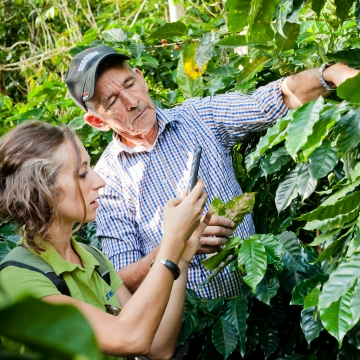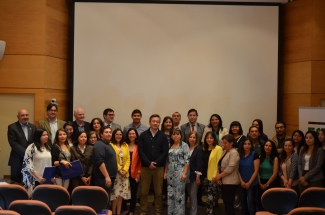Clean up your own mess: An experimental study of moral responsibility and efficiency
Although market-based environmental policy instruments feature prominently in economic theory and are widely employed, they often face public resistance. We argue that such resistance may be driven by moral responsibility, where citizens prefer to tackle the environmental problems that they have caused by themselves, rather than delegating the task to others by means of a market mechanism.
Closing ceremony with principals, teachers and the regional representative of the Ministry of Environment in the Bio-Bio Region.
The project focused on evaluating the direct and indirect effects of an educational program on students’ and parents’ knowledge, attitudes, and practices (KAP) regarding consumption and disposal of
Analyzing the effect of biodegradable packaging on plastic consumption in the wholesale market: a field experiment in the Costa Rican farmer’s market
Command and control instruments, such as Plastic-bag bans, have been effective in countries with a strong enforcement mechanism. In developing countries, these instruments have been partially
Reducing marine debris pollution by changing household behavior through children education
This paper aims at evaluating the direct and indirect effects of an educational program on students’ and parents’ knowledge, attitudes, and practices (KAP) regarding the consumption and disposal of

3rd Annual CECFEE Workshop
The Centre for research on the Economics of Climate, Food, Energy and Environment (CECFEE) of the Indian Statistical Institute organized the 3rd annual CECFEE on 17-18th of November, 2017. The…
Celebrity endorsement in promoting pro-environmental behaviour
There is greatly growing attention to tackling plastic pollution issues. Previous studies proposed various instruments dealing with plastic problems. Education and information programs are frequently

CECFEE Annual Policy Day 2019
CECFEE held its 2nd Policy Day on 10th November, 2019 by organizing a discussion on conservation of forest resources and wildlife. The key speaker for this event was Mr. P.Sivakumar, IFS, Director of…

5th Annual CECFEE Research & Policy Workshop, Tezpur University, Assam
CECFEE hosted its 5th Annual Workshop at the University of Tezpur, Assam. The workshop spanned two days, 10-11 November 2019, and brought together an eclectic mix of researchers and academics. Broadly…

4th Annual CECFEE Research and Policy Workshop
The Center for research on the Economics of Climate, Food, Energy and Environment (CECFEE) of the Indian Statistical Institute, New Delhi, will conduct the 4th Annual CECFEE Research and Policy…
Pagination
- Previous page
- Page 13
- Next page


